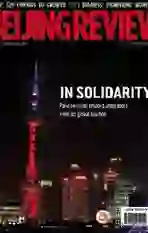Myanmar Election:Just the Beginning
2015-12-14ByYuLintao
By+Yu+Lintao
Myanmars long-time opposition party, the National League for Democracy(NLD)— led by the legendary figure and Nobel Peace laureate Aung San Suu Kyi—secured an overwhelming victory against the military-backed ruling party in the countrys November 8 election.
One explanation for the NLDs extraordinary support comes as the common aspiration of the Myanmar society for “change.”
Yet reinventing Myanmars social and economic traditions of governance and translating them into tangible benefits for its citizens is a daunting task, as the country lost decades of development opportunities due to its internal turbulence, insular policies, and resulting sanctions from Western countries.
U.S.-based Time magazine predicted Myanmar would be “Asias next economic tiger”in a report published in 2012, citing its high number of low-cost workers and large amounts of timber and mineral reserves. The “tiger” development model is described by economists as being export-driven, following the route taken by other Asian economies.
Three years on, however, the economic situation in Myanmar has not changed much. The deteriorating infrastructure, corruption and unpredictable policy environment discouraged investors who were initially eager to tap into the emerging market.
The per-capita GDP of Myanmar is currently around $1,000, ranking near last among members of the Association of Southeast Asian Nations. In addition to political change, the country is in desperate need of economic development.
The complicated domestic environment and the high hopes pinned on the future ruling party will present serious challenges to the new government.
Myanmars incumbent President Thein Sein, a former military commander, has promised to transfer power to the incoming leader in 2016. But the relationship between the NLD and the military must also be addressed, since the military enjoys a unique position in the countrys political system, controlling several key positions of the Myanmar Government even post-election.
Under Myanmar law, the military appoints 25 percent of the representatives in both of the countrys two legislative bodies, the House of Nationalities (upper house) and the House of Parliament (lower house). The public elects just 168 of the 224 representatives in the upper house. In the lower house, 110 of the 440 positions are given to military representatives.
In short, although Suu Kyis record of challenging military rule has earned her party record support, current law requires the party to work with the military to govern the country.
As the incoming ruling party, NLD needs to prepare for its role reversal, moving from opposition into leadership. That requires determining who will be elected by the party delegates to serve as the countrys president, since a recent change in constitutional law put in place by the military prevents anyone with foreign family members from becoming the nations leader.
Suu Kyis late husband was British and her sons hold British passports. But Suu Kyi is pushing forward regardless, promising to be “above the president” if she cant serve as president herself.
Another looming problem that Suu Kyis NLD must address is national reconciliation for this religiously diverse and multi-ethnic society with several indigenous cultures.
The nations military has been in conflict with minority militants for over half a century. It has not only inflicted heavy losses on the countrys economic development, but has also resulted in a large number of both civilian deaths and refugees.
After a nearly two-year peace process, eight of the 15 ethnic groups in the country that have been fighting the governmental army only signed a ceasefire agreement in October.
The NLD has already vowed to pursue national reconciliation with the roughly 30 percent of the country that is not ethnically Burmese.
The question remains if the NLD will be able to bring the internal conflict to an end by meeting the demands of both the ethnic groups and the military. Doing so will require the great wisdom and leadership of Suu Kyi and the support of the people across different sectors and sects.
